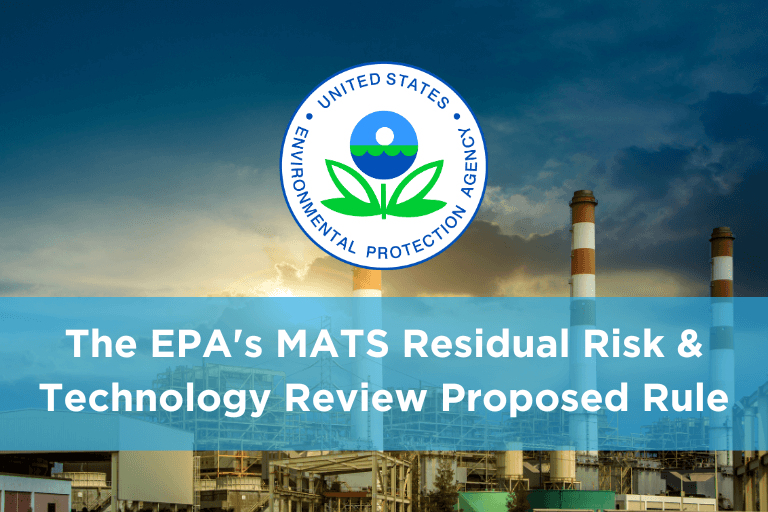MATS Review Background
On April 5, 2023, the EPA proposed a rule to address findings from the 2020 Residual Risk and Technology Review (RTR) for the Mercury Air Toxic Standards (MATS). The EPA is required every eight years to review and revise, as necessary, the maximum achievable control technology standards (MACT) considering development practices, processes, and control technologies. This proposed rule seeks comments on several suggested changes to MATS. Once published in the Federal Register, the public will have 60 days to comment on the proposed rule.
In summary, the EPA is proposing to strengthen and update the National Emission Standards for Hazardous Air Pollutants for Coal- and Oil-Fired Electric Utility Steam Generating Units (EGUs), commonly known as the Mercury and Air Toxics Standards (MATS) for power plants to reflect recent developments in control technologies and the performance of these plants. This proposed rule reflects the most significant improvements and updates to MATS since EPA first issued these standards in February 2012. It also fulfills EPA’s responsibility under the Clean Air Act to periodically re-evaluate its standards in light of advancements in pollution control technologies to determine whether revisions are necessary.
What Do These Changes Mean?
This program affects Electric Generating Units (EGUs) subject to MATS. Proposed changes include a lowering of the filterable particulate matter (fPM), a new Mercury (Hg) limit for lignite facilities, a PM CEMS requirement for all facilities (testing and CPMS are no longer allowed for compliance), and removal of startup definition #2. The EPA also proposed to remove non-metal limits but proposed no changes to work practice standards, acid gas standards, oil-fired facilities, and IGCCs.
Outline of Proposed Changes
Below is a list of key proposed changes for MATS. These include:
- New fPM Limit: 0.03 lb/MMBtu to 0.01 lb/MMBtu – EPA is also taking comments on if it should be 0.006 lb/MMBtu
- New Hg Limit for Lignite Coal Plants: 4.0 lb/TBtu to 1.2 lb/TBtu – This is the same limit as Bituminous and Subbituminous Coal Plants.
- PM CEMS required for all plants – Testing is no longer an option, and CPMS are no longer allowed, making LEE status for PM no longer relevant.
- Removes the option for Startup Definition #2, which gives an additional 4 hours for startup – All plants will have to comply with Startup Definition #1.
- Removal of Non-Hg Metals – This would apply to both individual and total emission limits as compliance options.
- No changes are proposed for the following:
- Work Practice Standards for Organic HAPs
- Acid Gas Standard for Coal-Fired Units
- Standards for Liquid Oil-Fired or IGCC Units
- The timeline for compliance is three years for PM Limit, PM CEMS, and Hg Limits and 180 days for Startup Definition #2 removal.
For more information, please read the Fact Sheet for the MATS Proposed RTR from the EPA. ESC Spectrum is closely following these proposed changes as they will impact many of our customers, and we will continue to update you as needed.
How Can ESC Spectrum Help?
If you have any questions about how the Proposed MATS RTR may affect your air emissions compliance and monitoring processes, please get in touch with the ESC Spectrum Regulatory Services team. We also provide full CEMS solutions, including CEMS Maintenance to ensure your equipment is functioning properly, as well as repair and upgrade services to restore your systems.
By keeping your system up-to-date, your facility will better manage allowance compliance strategies. Our team is standing by to assist facilities in effectively managing the operation of Selective Catalyst Reduction Monitors (SCRs). For an overall assessment of your CEMS equipment, schedule a sitewalk with one of our CEMS technicians.
Interested in learning more about regulations and staying in compliance? Read our Definitive Guide to Air Emissions Regulations.

Susan Kennedy, QEP - Regulatory & Reporting Manager
Susan joins ESC Spectrum from the Power Industry sector where she spent 25+ years helping power plants and associated facilities comply with environmental laws and regulations. During her tenure at Progress Energy (now Duke Energy Florida) and Gulf Power Company, she supported various environmental programs covering all media. Her technical background includes permitting, compliance and reporting for wastewater, water use, groundwater, remediation, Title V, Title IV, CEMS, Green House Gas, Florida Annual Operating Reports, Air Testing, Reciprocal Internal Combustion Engine (RICE), Risk Management Plans and Toxic Release Inventory. She received both her Bachelor of Science (’92) and Master of Science (’96) degrees from Auburn University.


